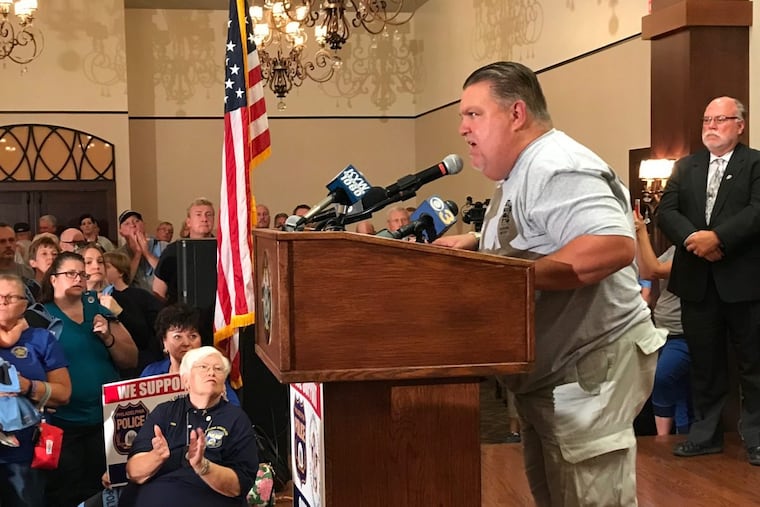Kenney bemoans police union chief's 'rabid animals' comment
The mayor said using "divisive words gets us nowhere" in response to the city police union president's calling protesters a "pack of rabid animals" for demonstrating outside the home of an officer involved in a fatal shooting in June.

Mayor Kenney said Tuesday that using "divisive words gets us nowhere" as he responded to the city police union president's calling protesters a "pack of rabid animals" for demonstrating outside the home of an officer involved in a fatal shooting in June.
On Aug. 24, a handful of Black Lives Matter protesters engaged in a provocative demonstration outside Officer Ryan Pownall's home in Bustleton. The officer's home was protected by a large contingent of police, who also had to keep the protesters apart from angry neighbors.
John McNesby, president of Fraternal Order of Police Lodge 5, called the protesters a "pack of rabid animals" at a rally in support of police held at the union's Northeast Philadelphia headquarters last week. The comment drew criticism from across the country.
"While a few individuals have engaged recently in rhetoric and actions that crossed the line, for the large part their conduct wasn't illegal, and escalating the rhetoric in response doesn't help. Referring to black people as animals has a long, painful history in this country. Fighting divisive words with divisive words gets us nowhere," Kenney said in a statement first published online by Philadelphia Magazine.
Lauren Hitt, the mayor's press secretary, provided a copy of the statement to the Inquirer and Daily News.
"Fortunately, while others rely on rhetoric, the overwhelming majority of Philadelphia officers who police demonstrations respond to inflammatory, confrontational language with professionalism and a commitment to the First Amendment. Likewise, the overwhelming majority of protesters have engaged in peaceful protest. Together, I believe they will create a stronger, more united Philadelphia," Kenney said.
Asa Khalif, who led the demonstration outside Pownall's home, said Kenney's statement was inadequate and likened it to President's Trump's response to Charlottesville, Va., in which Trump said both sides were to blame.
"He chose to take the coward's way," Khalif said of Kenney.
Khalif also said McNesby's comments were "violent and dangerous," putting himself and other protesters in danger.
"Rabid animals are put down, are usually shot," Khalif said.
McNesby could not be reached for comment, but he told the magazine that he was not making a racial comment.
"I never referred to black people as animals. I referred to the group of small individuals who protested outside that officer's house as rabid animals. They were chanting and screaming things regarding his wife and kids. I don't even know if they were black, white, Asian," McNesby told the magazine.
A day after the protest, the police union went to court and obtained a ruling, agreed to by the city, that while the city can still release the name of an officer involved in shooting a person 72 hours afterward, the union may seek an emergency petition to halt the release of the officer's name. A full hearing on the matter is scheduled for Sept. 29.
The union is supporting legislation that delays the release of an officer's name for 30 days after a shooting
Pownall fatally shot David Jones, 30, in North Philadelphia on June 8. Police said Jones reached for an illegal gun he was carrying and then ran away. Pownall shot him in the back.
When asked if he and other protesters would return to Pownall's home, Khalif said: "Nothing is off the table."